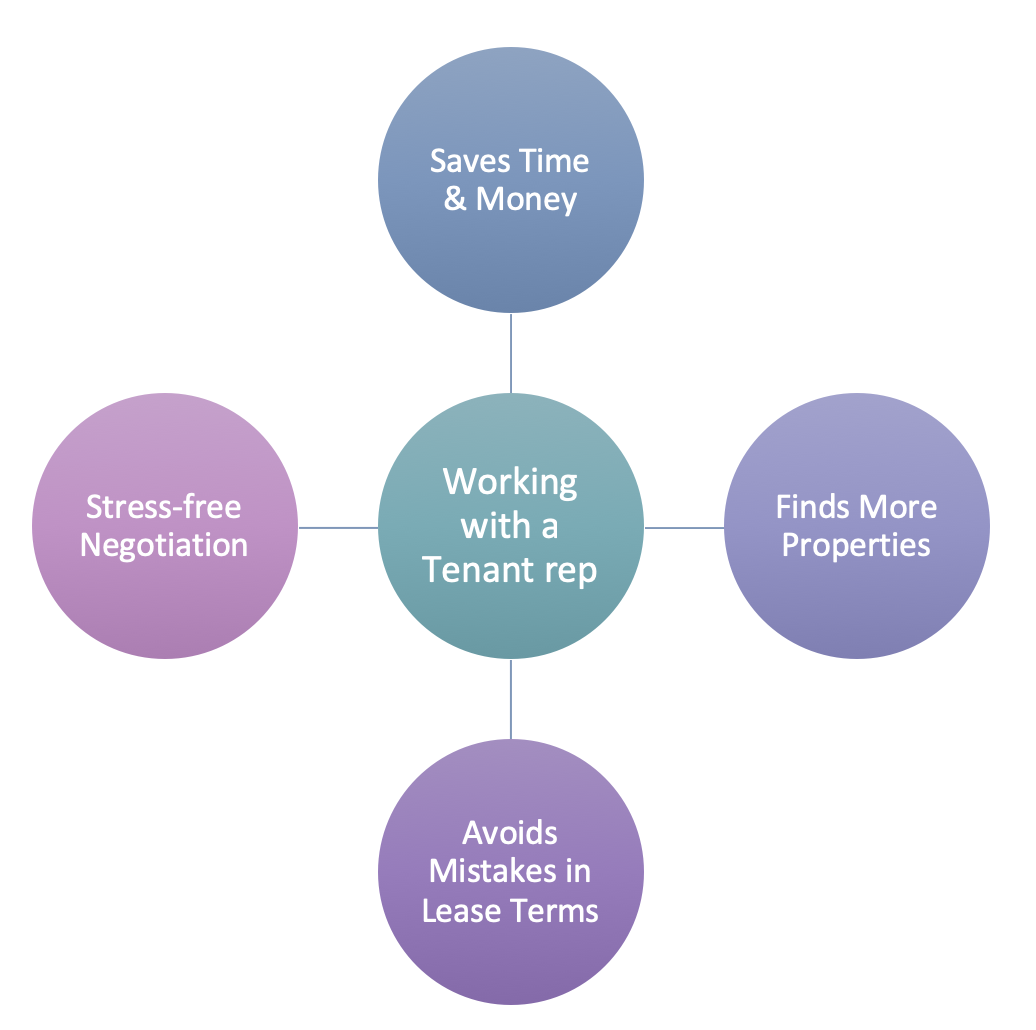In this article, you'll learn:
- How to avoid conflicted brokers who represent both tenants and landlords.
- Why the size of a brokerage firm can affect service quality.
- The key benefits you should expect from a good tenant rep.
You’re busy. You don’t have all the time to familiarize yourself with the nitty-gritty details of 50+ page leases. So, at this point, you’ve probably decided that working with a commercial broker will lessen the load of making CRE decisions. Tenant reps ease the process of finding and leasing new space, but have you isolated what your ideal representative will look like?
As tenant reps, we have spent over three decades running real estate deals for our corporate clients. This experience has informed us of what professionals expect and what they don’t from a CRE representative relationship.
We aren’t saying that there is one rep you should always use- but these are facts you should know before signing on with an agent. So read on to find out how you can find a broker who will save your company millions in real estate costs by:
- Watching out for conflicted brokers
- Knowing that the size of brokerage firms may influence their service
- Being aware of the benefits you should expect by working with a rep
1. Stay Away from Conflicted Brokers
Conflicted brokers go by many names, including: “Dual agents,” “Corporate service brokers,” and “Designated agencies.” But, no matter the terminology, they are all jargoned terms for what conflicted brokers really are: wolves in sheep’s clothing.

Conflicted brokers represent both the landlord and tenant in real estate transactions. They are to be avoided at all costs by tenants who want to isolate the optimal building, features, and price.
Why?
You will not be able to receive an advantageous deal when your agent or firm also has an interest in the property they show you.
Not only may you not see as many properties working with a conflicted broker, but there will also be less incentive for them to negotiate down costs for you. This is because they receive a commission from the landlord, so the bigger the landlord’s profit margin, the bigger payday they receive.

How to Spot a Conflicted Broker
It is usually quite simple to identify a conflicted broker. If they advertise property listings on their website or other mediums, they also represent landlords.
Often, conflicted brokers will attempt to dissuade tenants’ fears by claiming that there is a proverbial firewall that separates the tenant broker and landlord broker departments. While your broker may not work directly with the landlord or their broker, they report to the same chain of command.

This is an obvious conflict of interest. How could your broker promise you the best deal when they also represent the landlord?
Would you want your attorney to also defend the other party in court?
2. When Looking for a Tenant Rep, Size Matters
When selecting a brokerage firm, it is often essential to note the organization's size. While size is not necessarily an advantage or disadvantage for any firm, you may find that there is a different level of service across small and large firms.
Depending on what you’re looking to achieve with your broker, you may want to hone your focus on finding either small or large real estate firms.
Small Firms
Small firms provide intense dedication to their clients. It’s not that large firms don’t, but they may not be able to match the level of focus that small firms can achieve. Small firms often maintain a closer, personal touch in their relationships with clients.

When you are one of only several clients, you are assured that the details of your deal are being thoroughly analyzed daily.

The representative running your deal may not even be the primary recipient of the commission. You are subject to layers of overhead and bureaucratic structures. When any action is subject to the analysis of more channels, things slow down. This may mean that it may take you longer to find and occupy a building.
Similarly, when working with small firms, the team you start with is the team you end with. They can respond nimbly to your requests and work solely with your best interests in mind.
Small firms are:
- Nimble
- Not subject to internal hierarchies
- Able to make decisions and integrate technology quickly
- Personal- You know who you’re dealing with
Large Firms
The massive bandwidth of a large organization equips them to run many deals at once. For example, if your company needs to dispose of multiple properties as soon as possible, you probably would want to work with a large brokerage firm.
Since they also house many departments, large firms can also offer property management services. However, if you work with a large firm, you should know what you’re getting into. Due to their extensive breadth, most large organizations represent both tenants and landlords. We have already discussed what a conflict of interest this can be for tenants.

Although you may be leaving millions of dollars on the table, prominent household names are associated with a level of prestige that often won’t be questioned, regardless of whether they can get you the best deal. No one ever got fired for buying IBM.
The downside of small firms is that they may appear too risky for some organizations. While they provide the same, if not higher, level of service as large firms, your boss may not want to take a gamble on a name they don’t recognize.
Large Firms are:
- Equipped with significant manpower
- Able to dispose of large quantities of properties
- Recognizable in name
3. Know The Benefits a Good Broker Should Provide
Commercial brokers like tenant reps handle the CRE dirty work, so you don’t have to. However, it is good to be aware of the benefits they provide so you have clear expectations of the responsibilities they should be fulfilling. If your current rep does not match your expected performance level, you should find one who will.
Ideally, working with a tenant representative will:
- Find you 3-4 times the number of suitable sites
- Let you focus on your day job
- Connect you to the professionals you need
- Help you avoid costly mistakes
- Honestly compare all suitable sites
- Thoroughly analyze lease terms
- Conduct negotiations with your landlord, far beyond just rent
Why Use a Tenant Rep?
When real estate mistakes could potentially cost your company millions of dollars, you don’t want that responsibility on your head. Working with a professional who will provide the highest level of service and market knowledge will help you avoid the fate of real estate nightmares.
Finding properties and negotiating leases can be a hair-pulling process. Numerous, costly landmines in your lease can blow up in your face. Each clause should be thoroughly analyzed for what is laid out, and what has also been omitted. Of course, this is time-consuming, but by working with a rep, you can save your time and retain your peace of mind as you know a professional is working on your behalf to protect your interests.

If you’re doing it yourself, you may be leaving money on the table. This is also true if you work with the wrong firm. When real estate is typically a company’s second most significant cost, mistakes are expensive… really expensive. So don’t risk your budget by going it alone or working with a conflicted broker.
Tenant reps are real estate professionals who only work with tenants. This unbiased representation is critical to finding the best properties and the terms that make the most sense for your organization. In addition, they work for you, not the landlord’s broker. By doing so, they typically provide higher savings, more perks during negotiation, and advantageous lease clauses.
Click below to schedule a meeting with a tenant rep today!
Wondering where to begin?
Related Content
- Optimize Your Commercial Real Estate for the Recession
- 6 Things Tenant Reps Want You To Know
- Lease Or Buy, Which Is Best For Your Company?
- Key Site Drivers (KSDs) for Your Commercial Property Search Criteria






